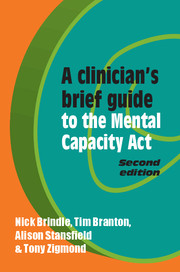Book contents
- Frontmatter
- Contents
- Preface
- Preface to the second edition
- Common abbreviations and terms
- 1 The legal framework: the Mental Capacity Act, the Human Rights Act and common law
- 2 The Mental Capacity Act and the authority to treat
- 3 Assessment of capacity
- 4 Best interests
- 5 Alternative authority – planning for the future
- 6 Independent Mental Capacity Advocates and regulation of research
- 7 Deprivation of Liberty Safeguards
- 8 The Court of Protection, clinically relevant judgments from the courts and writing reports
- 9 The Mental Health Act
- References
- Index
9 - The Mental Health Act
Published online by Cambridge University Press: 01 January 2018
- Frontmatter
- Contents
- Preface
- Preface to the second edition
- Common abbreviations and terms
- 1 The legal framework: the Mental Capacity Act, the Human Rights Act and common law
- 2 The Mental Capacity Act and the authority to treat
- 3 Assessment of capacity
- 4 Best interests
- 5 Alternative authority – planning for the future
- 6 Independent Mental Capacity Advocates and regulation of research
- 7 Deprivation of Liberty Safeguards
- 8 The Court of Protection, clinically relevant judgments from the courts and writing reports
- 9 The Mental Health Act
- References
- Index
Summary
The existence of the Mental Health Act means that the rules and procedures for the non-consensual admission to, and treatment in, hospital for mental disorder are different from those for physical illness. As a judge has said ‘In our judgment Parliament provided an exhaustive code concerning compulsory admission to hospital in Part II MHA. Sections 2–6 cover procedure for hospital admission which include in s.4 admission in emergency situations. We do not accept that there is any lacuna in MHA in relation to the period when a person is at the hospital pending an application under s.2 or s.4 MHA’: neither the MCA nor the ‘common law principle of necessity’ applies.
The single most important difference between the Mental Health Act and the Mental Capacity Act is that the MHA authorises compulsory admission to and detention in hospital, and medical treatment despite the patient's capacitous refusal. In other words, most of the rules and principles you've just read about don't necessarily apply if the person has a mental disorder that presents risks to their health or safety or to other people. A very brief overview of the grounds for detention and treatment is given below. For those who may need to use the MHA there are many helpful texts.
The key message is: consider the MHA when faced with a patient with a mental disorder who, in your opinion, requires treatment that the patient is refusing or that cannot be given for some other legal reason (e.g. because there is a valid, applicable advance refusal or refusal by the donee of a lasting power of attorney).
The essential difference between the two Acts was demonstrated in the sad case of a 26-year-old woman who took her own life by swallowing antifreeze. That she had the capacity to refuse treatment, and did so refuse, was confirmed by all the health professionals who saw her. It is much less clear whether any consideration was given to detaining and treating her under the Mental Health Act, which, in the circumstances, may well have been an option.
- Type
- Chapter
- Information
- A Clinician's Brief Guide to the Mental Capacity Act , pp. 108 - 123Publisher: Royal College of PsychiatristsPrint publication year: 2015

